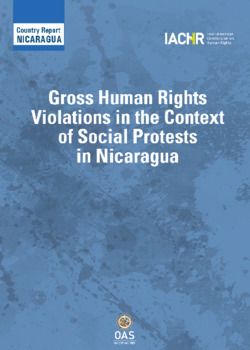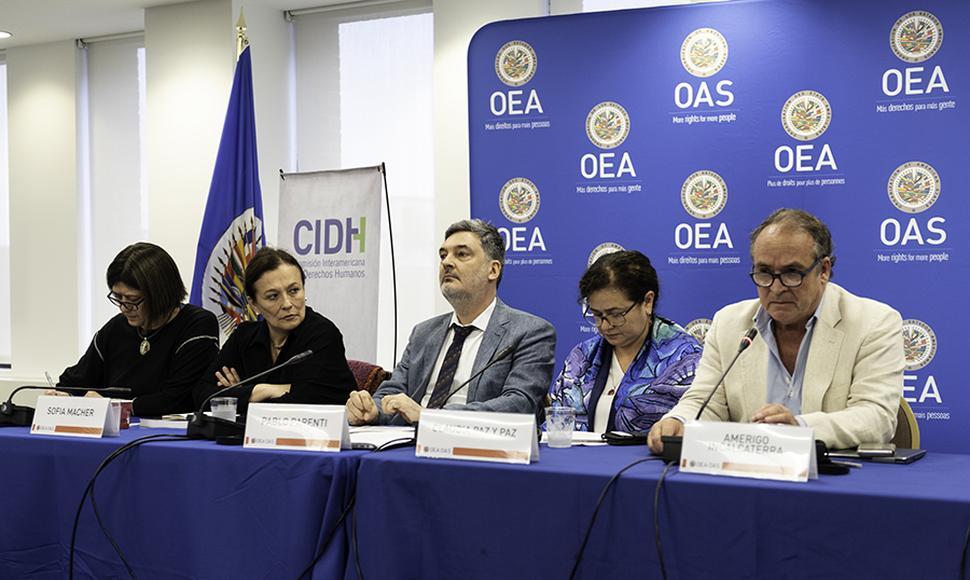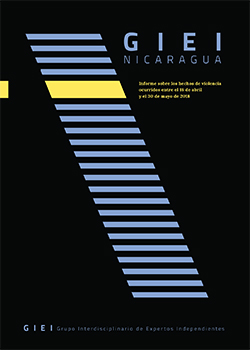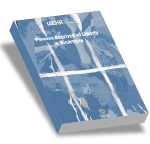- English
- Español

MESENI
- About the MESENI
- Registry of Victims
- Press Releases
- Precautionary Measures
- Newsletter
- Activities
- Reports
- Pronouncement on social networks
- Contact us
Lastest Newsletter
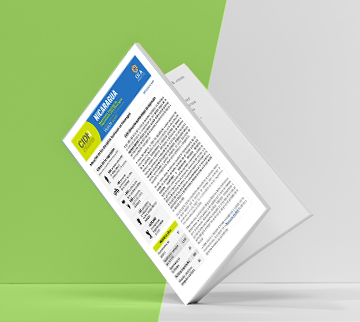
Aug/Sep 2020
Fatal Victims Registry: Timeline
Based on the permanent monitoring of Nicaragua, the Commission has documented six stages or phases of state repression under different modalities and intensities from April 18, 2018, to June 2021.
In this timeline, the IACHR presents the main patterns of human rights violations that have characterized these stages, some of the most relevant events in the context of the human rights crisis in Nicaragua, as well as the activities carried out by the IACHR, through MESENI, since April 2018.
The IACHR registers 355 people who died in the context of the human rights crisis in Nicaragua from April 18, 2018, to June 2019
FIRST STAGE OF THE REPRESSION
 Manifestacion Catedral – Crédito: Oscar Sánchez
Manifestacion Catedral – Crédito: Oscar Sánchez
In this first stage, the IACHR recorded attacks on mass demonstrations, disproportionate use of force by the National Police, hooded and armed parapolice groups, massive arrests, hundreds of dead and injured people, and installation of roadblocks and barricades.
additional information ...
The IACHR makes a working visit to Nicaragua and issues first recommendations to the State of Nicaragua. In June, he announced the creation of the Interdisciplinary Group of Independent Experts for Nicaragua (GIEI) and installed the Special Monitoring Mechanism for Nicaragua (MESENI).
additional information ...SECOND STAGE OF THE REPRESSION
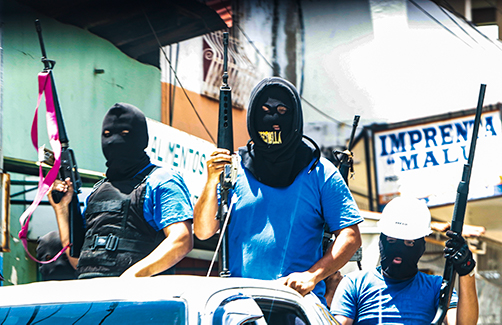 Monimbo Masaya paramilitares – Crédito Oscar Sánchez
Monimbo Masaya paramilitares – Crédito Oscar Sánchez
"Operación limpieza", an operative of the National Police with the participation of armed parapolice with the aim of dismantling roadblocks and barricades installed by the Nicaraguan population to protect themselves from attacks. The repression deployed in this stage had very relevant lethal effects, with 90 people being murdered, representing 25.2% of the total fatalities of the crisis to date.
additional information ...THIRD STAGE OF THE REPRESSION
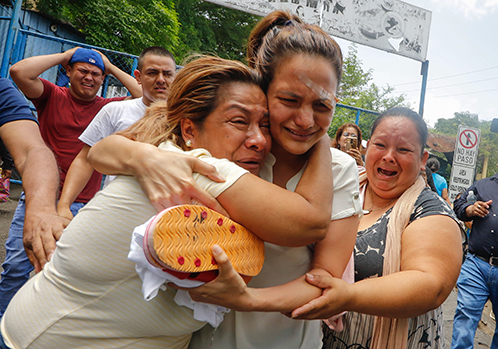
In August 2018, the Commission identified a third phase of the repression that spans from August to November 2018, consisting mainly of the selective and massive persecution and criminalization of protesters, human rights defenders, students, social leaders, and opponents of the government, including media workers opposed to the government, under unfounded and disproportionate charges such as terrorism, irregularities in access to justice, the right to defense and due process for the accused; as well as violations of the human rights of persons deprived of liberty and their families.
additional information ...
From October 14 to 18, 2018, the IACHR conducted a working visit to Costa Rica for the purpose of monitoring the situation of Nicaraguan asylum seekers and persons in need of international protection who have been forced to flee Nicaragua in the protection of their freedom and integrity and in order to seek international protection in Costa Rica.
additional information ...FOURTH STAGE OF THE REPRESSION
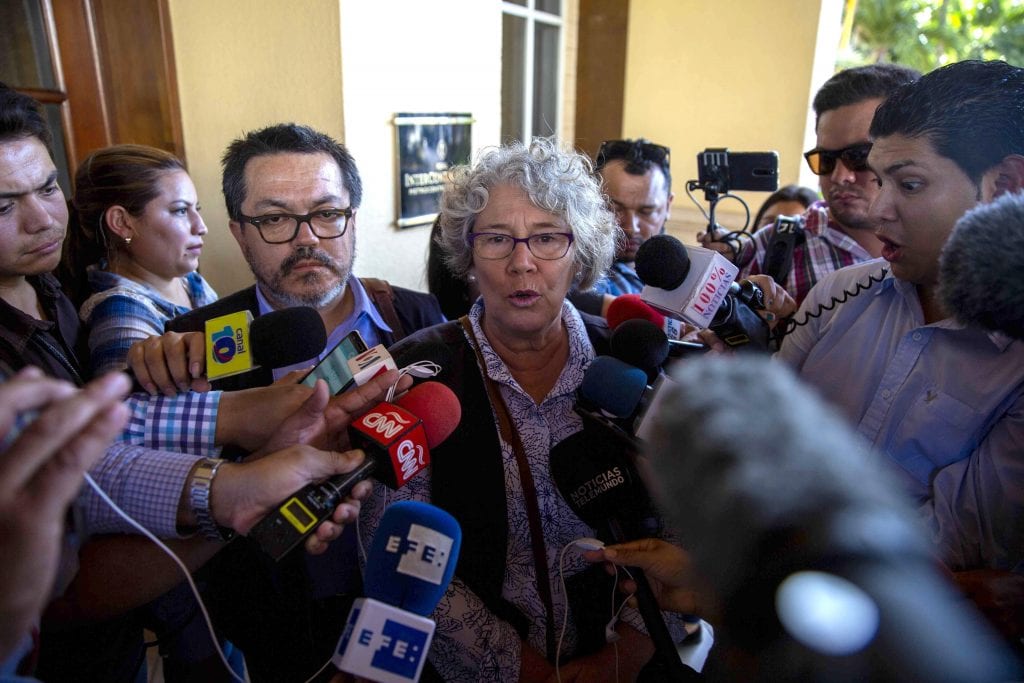 Crédito: EFE
Crédito: EFE
Closure of democratic spaces and a prolonged weakening of democratic institutions in Nicaragua, which has resulted in the perpetuation of the human rights crisis in the country, as well as in the generation of a situation of structural impunity concerning the serious human rights violations committed.
additional information ...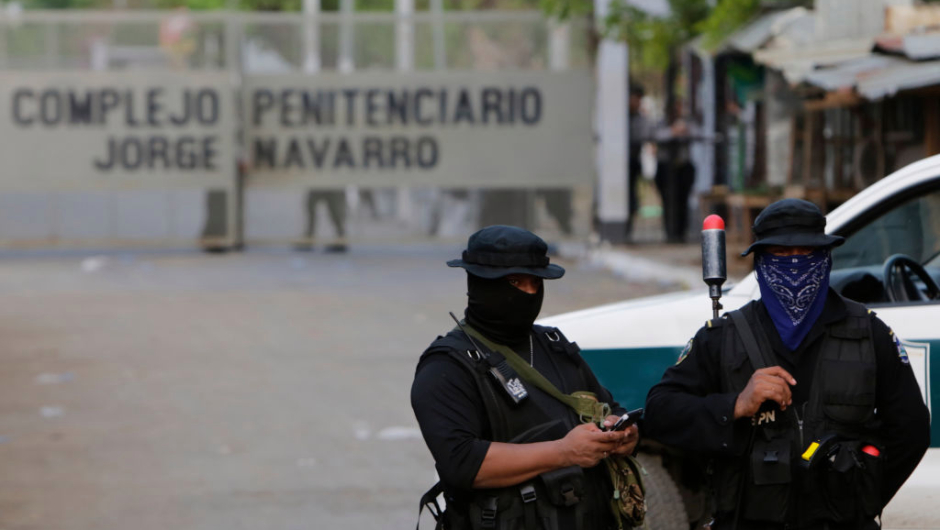 Crédito: Inti Ocon/AFP/Getty Images
Crédito: Inti Ocon/AFP/Getty Images
Prolonged weakening of democratic institutions, the perpetuation of the human rights crisis, as well as the generation of a situation of structural impunity with respect to the serious human rights violations committed in the framework of the protests.
additional information ...FIFTH STAGE OF THE REPRESSION
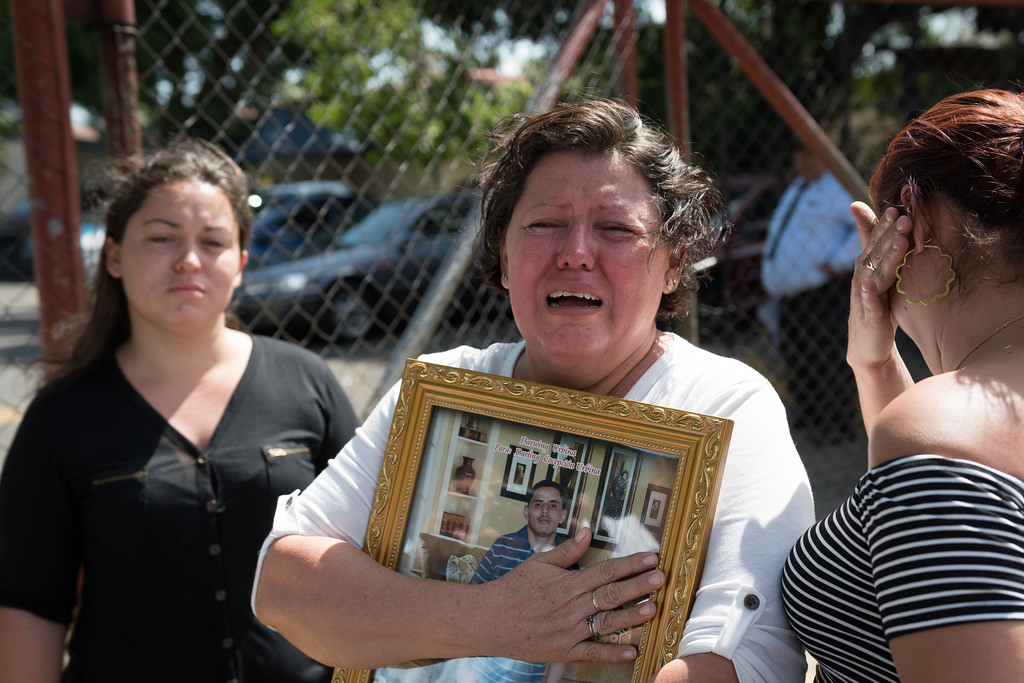
This new repressive stage would represent the most intense and systematic attack on public freedoms that occurred since the beginning of the 2018 crisis and would have the purpose of maintaining the complete closure of democratic spaces in the country.
additional information ...SIXTH STAGE OF THE REPRESSION
- Jan - Jun 2021 -
In the electoral context in Nicaragua, the IACHR registers an increase in arrests and trials of people identified as political opponents, application of the Law for the Defense of the Rights of the People to Independence, Sovereignty, and Self-Determination for Peace, No. 1055.
additional information ...FIRST STAGE OF THE REPRESSION April - June 2018
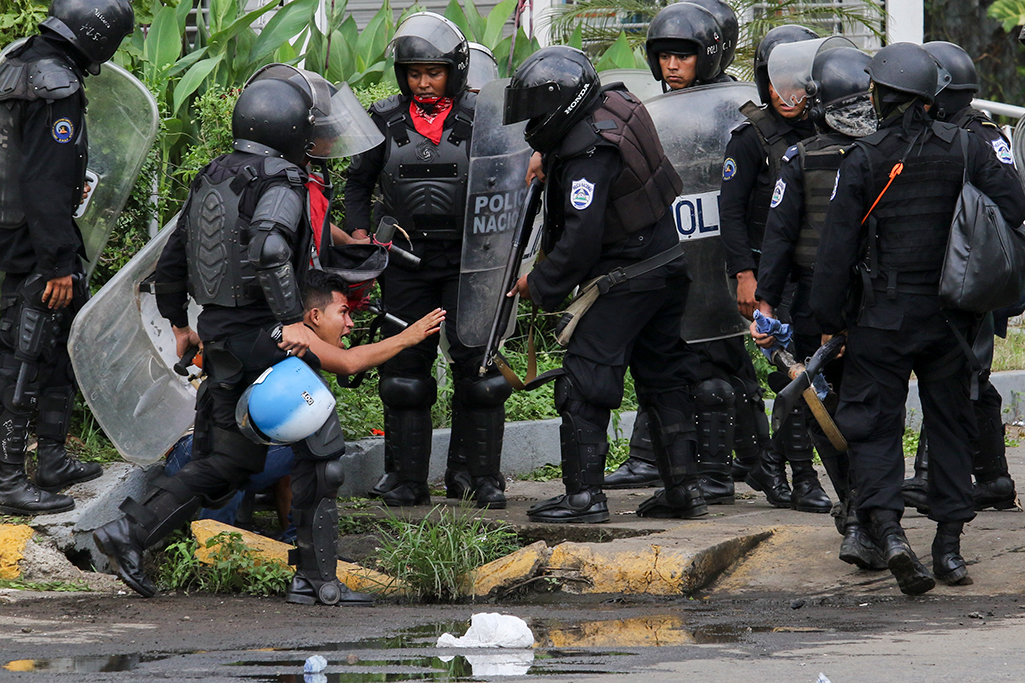
Crédito: OS16
The Commission denounced common patterns of human rights violations that characterized the first stage of the repression, among them the following stand out: the excessive and arbitrary use of police force, the use of vigilante groups or shock groups with the acquiescence and tolerance of the authorities. state, obstacles in access to emergency medical care for the wounded, as a form of retaliation for their participation in the demonstrations. These patterns had lethal effects and at this stage 254 people were murdered, representing 71.3% of the total fatalities. Additionally, at this stage, there was a pattern of brief arbitrary detentions of young people and adolescents who participated in protests, the dissemination of propaganda and stigmatization campaigns, direct and indirect censorship measures, intimidation, and threats against leaders of social movements, and lack of diligence. at the beginning of the investigations regarding the murders and injuries that occurred.
Relevant facts

Crédito: Carlos Herrera
- On April 4, university students and environmentalists protested the fires in the Indio Maíz Biosphere Reserve and their dissatisfaction with the government's belated response in putting out the fires.
- On April 17, 2018, the State reformed the General Regulations of the Social Security Law to increase the mandatory social security contributions of workers and employers and impose on pensioners due to old age, disability, and disability a monthly contribution of 5% of the amount of their pensions for the Sickness and Maternity Branch of the active mandatory affiliates, an amount that would be discounted at the time of the pension payment by the Nicaraguan Social Security Institute (INSS).
- On April 18, the INSS reform is published in La Gaceta, the official newspaper, and protests begin in the City of Managua and León, which were attacked by "pro-government mobs." Students in Managua protest at the UCA Central American University and are attacked by “mobs”.
- On April 19, the first fatality was registered in Tipitapa, 17-year-old Richard Pavón. He was murdered, according to the complaint from his family, at the hands of local municipal personnel.
- From April 19 to April 22, protests and demonstrations were held in universities, including the Central American University -UCA-, National Engineering University -UNI-, Nicaraguan Polytechnic University -UPOLI-, Agrarian University and attacks on demonstrations in the León, Estelí, Managua, Masaya, and the North Caribbean Autonomous Region, as well as looting in local supermarkets. In the department of Estelí, coordinated actions of the National Police and groups of clashes were observed and two fires were produced, one in the University Center of UNAM -La CUUN- and the other in Radio Darío.
- On April 24, the IACHR expressed concern over deaths in the context of protests in Nicaragua. In the first five days of the demonstrations, at least 59 people died in Nicaragua, of which 5 were minors. In the department of Managua, the highest rate of fatalities was registered, with 45 deaths, of which 43 died as a result of the impact of bullets in the neck, skull, and thorax.
- On April 29, the National Assembly approved the creation of the Truth, Justice, and Peace Commission. Faced with the protests that did not cease in the face of state repression, the President expressed his openness for a National Dialogue, in which the Catholic Church would participate as a mediator. The Church requested the IACHR's visit to the country as one of the main conditions to establish the dialogue table.
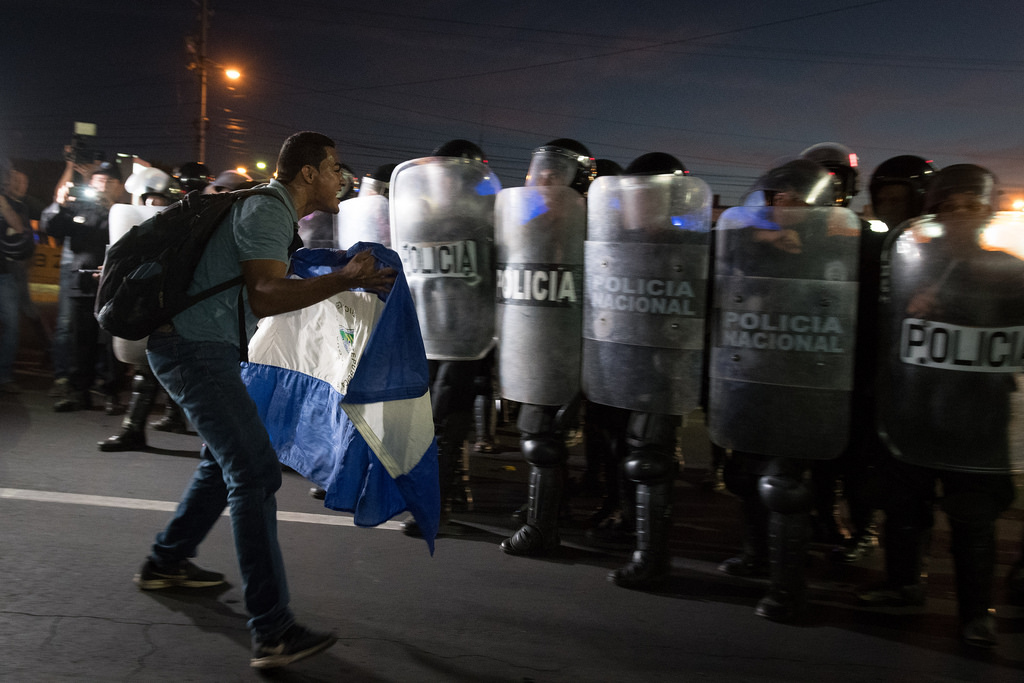
Crédito: Carlos Herrera
First Stage of the Repression May – June 2018

In these months, the IACHR observed a pattern of disproportionate use of force, extrajudicial executions, and massive and arbitrary detentions that occurred especially during the first days of the protests, to the detriment of students, workers, and young people who were in the area of the incidents, as well as attacks directed at university facilities, the media and some specific campuses. Likewise, at this stage, armed parapolice were found acting in a coordinated manner with the National Police in clashes with the protesting population.
Relevant facts

- On May 3, 2018, the IACHR announced the creation of a Rapid and Integrated Response Coordination Unit to Monitor Events, in order to give special attention to the human rights situation in Nicaragua through its various mechanisms.
- Between May 17 and 21, 2018, the addressed to the State.
- In May there are attacks on roadblocks in order to dismantle them and attacks on demonstrations continue. On May 30, the march of the Mothers is held, a commemorative march to the mothers of the first deceased, which was attacked resulting in 19 deaths registered by the GIEI.
- On May 30, the IACHR, the General Secretariat of the Organization of American States (OAS), and the State of Nicaragua created the Interdisciplinary Group of Independent Experts (GIEI), an international investigative mechanism in charge of assisting and supporting investigations of the deaths that occurred in the context of the acts of violence between April 18 and May 30, 2018.
- On June 22, the IACHR presents a report "Grave violations of human rights in the context of social protests in Nicaragua".
- On June 24, 2018, the IACHR installed the Special Monitoring Mechanism for Nicaragua (MESENI) with the aim of maintaining on-site monitoring of the human rights situation in accordance with the mandate of the IACHR and following up on the recommendations derived from the visit to the country, as well as compliance with the precautionary measures granted in this context.
IACHR visits Nicaragua
SECOND STAGE OF THE REPRESSION July 2018

In this second phase of the repression, which began in July, the Commission recorded human rights violations in the framework of the so-called “operación limpieza”. This operation was systematically deployed by the State in order to dismantle roadblocks and barricades in different cities of the country. During the operations, the IACHR documented the actions of the National Police in coordination with parapolice in different parts of the country, aimed at repressing the people who maintained the roadblocks and barricades, as well as the communities that supported them as a form of protest and / or as a means of protection against the actions of pro-government groups. As a result of these operations, some 90 people have died and many more have been injured.
Relevant facts

- On July 2, 2018, the IACHR announced the installation of the Interdisciplinary Group of Independent Experts (GIEI) with guarantees of autonomy and independence to assist and support investigations of the violent events between April 18 and May 30, 2018.
- On July 19, the IACHR confirmed the intensification of repression and operations by the police and vigilante groups. The Catholic Church was attacked on two occasions, on July 9 in Carazo the bishops are attacked by pro-government mobs in the Basilica of San Sebastián and on July 13 parastatal forces and the National Police attack, with firearms, the campus of the Autonomous University de Managua -UNAM- and the Iglesia Divina Misericordia in Managua, both located next to each other. In this action, the protesters Gerald Vasquez and Francisco Flores died of gunshot wounds that, according to complaints from their relatives and witnesses, were fired upon by the police and parapolice contingent that participated in the attack.
- Commissioner Antonia Urrejola, Rapporteur for Nicaragua and the then Executive Secretary, Paulo Abrão, visit Nicaragua again for the installation of the MESENI and the GIEI and to support the first activities of the MESENI, among them: four missions to liberate people detained in the Directorate of Judicial Aid.
- MESENI denounces the situation of vulnerability in which the girls, boys and adolescents found themselves. Girls were particularly affected by situations of sexual abuse and violence, especially after being detained; In the context of insecurity and violence in the country, girls, boys and adolescents would be exposed to situations of internal displacement, forced migration, separation of families and loss of loved ones; complaints were also received about children and adolescents deprived of liberty and disappeared.
THIRD STAGE OF THE REPRESSION August – September 2018
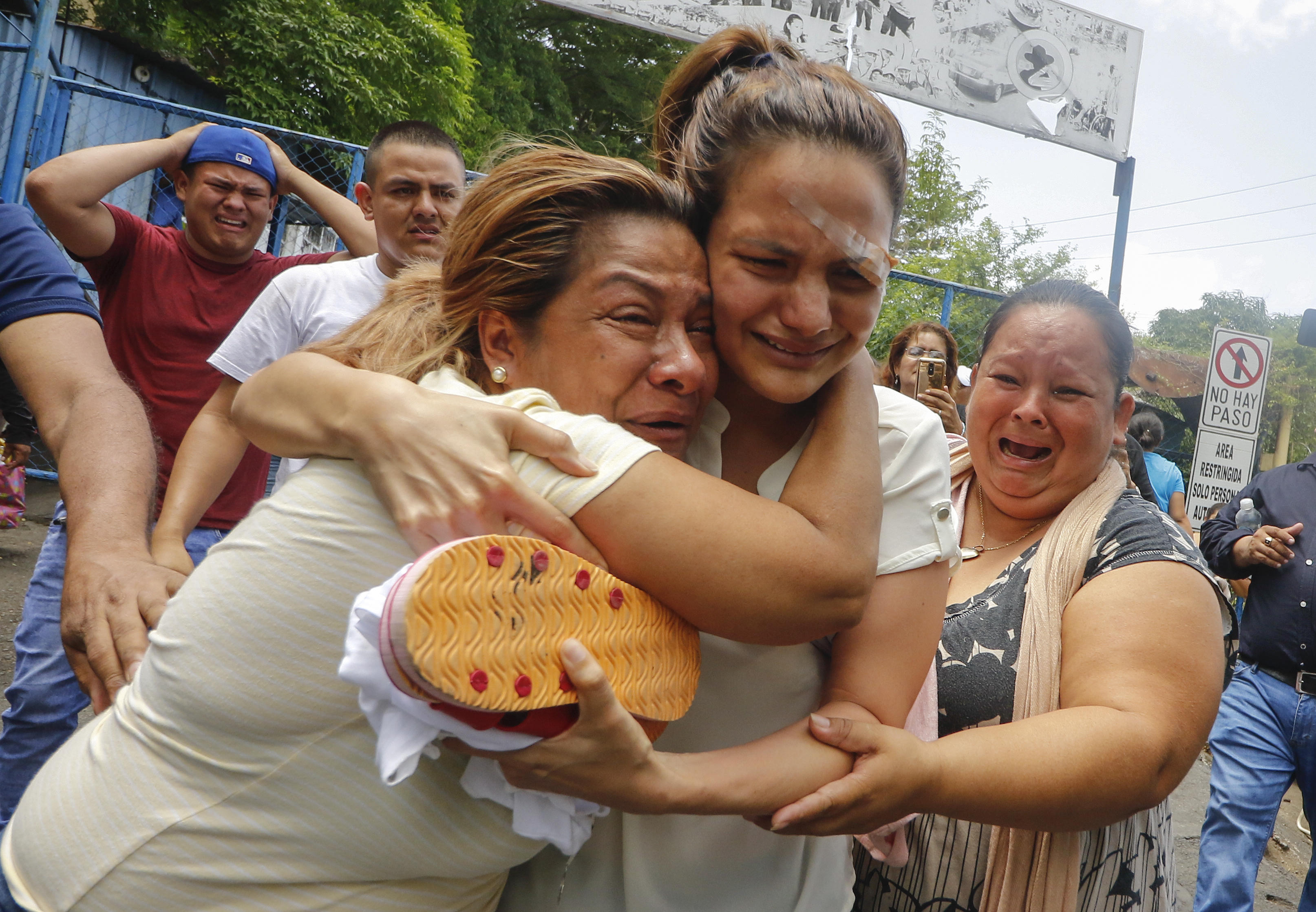
Crédito: Oscar Sanchez
In August 2018, the Commission identified a third phase of the repression that spans from August to November 2018, consisting mainly of the selective and massive persecution and criminalization of protesters, human rights defenders, students, social leaders and opponents of the government, including media workers opposed to the government, under unfounded and disproportionate charges such as terrorism, irregularities in access to justice, the right to defense and due process for the accused; as well as violations of the human rights of persons deprived of liberty and their families.
Relevant facts

Crédito: Oscar Sanchez
- The physical attacks on journalists by vigilante groups, theft and breakdown of equipment continue, affecting the exercise of the right to freedom of expression. On September 8, the IACHR's of the Special Rapporteur for Freedom of Expression condemned the persistence of constant threats against the safety of journalists, surveillance, and political pressure on the media in Nicaragua.
- From September 18 to 20, the IACHR's Rapporteurship on the Rights of Persons Deprived of Liberty carried out a working visit to Nicaragua with the aim of analyzing the conditions of detention of persons deprived of liberty for events associated with the protests that began in the past. April 18th.
- In September the attacks on demonstrations continued, the last march that is registered is carried out on September 23, 2018 under the slogan "We are the voice of political prisoners", which was attacked from early hours of the day by the National Police in coordination with a parapolice contingent. In this march, the 16-year-old high school student Matt Romero dies from a bullet impact, according to his relatives, shot by a civilian allegedly part of the pro-government parapolice contingents.
- On September 28, the IACHR together with the Office of the Special Rapporteur for Freedom of Expression expressed deep concern over the decision of the National Police to request authorization to hold protests in Nicaragua and warned of an increase in acts of violence to deter public demonstrations. In Nicaragua.
- MESENI observes a new pattern of selective repression through arbitrary arrests, illegal house searches in search of people who participated in protests and roadblocks, and opponents. The arrests were carried out without a court order, without informing detainees about the cause of their arrest, without being made available to a judge and they were denied access to relatives or defense. Once they were illegally detained, they were charged with false charges, without the family and / or legal representative being promptly informed of the preliminary hearing. As a consequence of these actions, a large number of people were forced to flee their homes and hide, and to move to other places both inside and outside of Nicaragua.
Third Stage of the Repression: Relevant facts Octuber – November 2018

- From October 14 to 18, 2018, the IACHR carried out a working visit to Costa Rica in order to monitor the situation of Nicaraguan asylum seekers and those in need of international protection who have been forced to flee Nicaragua for protection. of their freedom and integrity and in order to seek international protection in Costa Rica.
- On November 1, 2018, the IACHR published preliminary observations on the working visit to monitor the situation of Nicaraguans who were forced to flee to Costa Rica due to the human rights crisis in Nicaragua.
- The IACHR expressed its concern at the large number of Nicaraguans who were forced to move to other countries in the region as a result of their political opinions and the serious human rights violations that have occurred since the beginning of the April protests. 2018, as well as the activation of persecution and criminalization practices by the Nicaraguan State and other non-state actors, such as vigilante groups.
- The Rapporteur on the Rights of Women and Afro-descendants made a working visit to Nicaragua from October 25 to 27, 2018, with the aim of analyzing the human rights situation in the country, especially of women defenders, women deprived of freedom and people of African descent. During the visit, the IACHR expressed special concern about the conditions of detention of women deprived of liberty for events related to the protests in Nicaragua, which would characterize cruel, inhuman or degrading treatment or punishment. It also expressed concern about the climate of threats, harassment and intimidation that human rights defenders receive, especially women and people of African descent.
- On October 31, 2018, the IACHR and its Office of the Special Rapporteur for Freedom of Expression expressed their grave concern over the restrictions imposed on the media due to their critical coverage of government action in the face of protests in the context of the rights crisis. humans traversing the country. For its part, the IACHR's DESCA Special Rapporteur expressed its concern over the arbitrary dismissals and harassment against medical personnel, university teachers, and students.
FOURTH STAGE OF THE REPRESSION December 2018 - 2019
The fourth stage begins December 2018 and runs throughout the year 2019 . In December 2018, eight months after the protests began, the Commission identified a fourth stage of state repression characterized by the illegitimate restriction of the rights to freedom of expression, association and assembly through the cancellation of legal status of civil society organizations; the requirement of prior authorization to hold protests and greater restrictions on freedom of expression. An increase in acts of aggression and harassment against independent media and journalists was observed; the continuation of the detention and prosecution of leaders, human rights defenders and people opposed to the Government; and the arbitrary expulsion of naturalized persons or permanent residents who participated in the protests and of foreign journalists.
Relevant facts
- On December 13, 2018, the IACHR condemned the cancellation of the legal personality of human rights organizations in Nicaragua and experts on freedom of expression from the UN and the Inter-American System condemned the attacks and threats against journalists and the media in Nicaragua.
- On December 19, 2018, the State of Nicaragua communicated the decision to temporarily suspend the presence of the MESENI in the country, the visits of the IACHR, as well as the expiration of the term, objective and mission of the GIEI. The IACHR notes that this decision was communicated the day before the scheduled date for the presentation of the final report of the GIEI in Managua.
- On December 21, 2018, the GIEI published its final report on the acts of violence that occurred between April 18 and May 30, 2018. This report confirmed the findings of the IACHR's visit and also concluded that they had Conduct has been carried out in the context of a generalized and systematic attack against the civilian population that, according to international law, should be considered crimes against humanity, such as imprisonment or other deprivation of physical freedom, persecution, rape and torture.
Fourth Stage of the Repression 2019
In 2019, a context persists that limits the free exercise of human rights in the country and, in turn, prevents the full reestablishment of the rule of law and impunity prevails for the serious events that occurred in the framework of the State's violent response to social protests and arbitrarily deprived of liberty. Despite the beginning of a Negotiation Table in the country, the IACHR documented the persistence of human rights violations in Nicaragua that occurred under patterns that would indicate characteristics of systematicity and stated that both the state's efforts to close the spaces for complaint, as well as the prolongation of the state of exceptionality, have resulted in the worsening of the situation of freedom of expression in the country, as well as in the worsening of the conditions of human rights defenders, persons deprived of liberty, the identified peasant population as an opponent of the Government and; of the people who were released as a result of the Negotiation Table.
Relevant facts
- On May 16, 2019, the IACHR condemned the acts of violence that occurred in the facilities of the “Jorge Navarro” (La Modelo) National Penitentiary System, in Nicaragua, in which 57-year-old Eddy Antonio Montes Praslín died, in addition to around 26 people injured, including 6 prison officials.
- Between May 19 and 24, 2019, Commissioner Joel Hernández made working visits to Costa Rica and Honduras to monitor and follow up on the situation of Nicaraguan people who have been forced to flee to these countries as a result of the crisis. started on April 18, 2018 in Nicaragua.
- In June 2019, the IACHR expressed concern about the approval of the Amnesty Law due to its ambiguous and broad content in which serious human rights violations that have been widely documented could go unpunished, avoid establishing the truth , justice, reparation and guarantees of non-repetition, as well as restricting the rights and guarantees of Nicaraguan society contained in the American Convention.
- On June 25, 2019, the Special Follow-up Mechanism for Nicaragua (MESENI) of the IACHR presents a report on the actions carried out, the results, and the impact achieved after one year of its installation and operation.
- On June 17 and 18, 2019, Commissioners Esmeralda Arosemena, then President of the IACHR, and Commissioner Antonia Urrejola, Rapporteur for Nicaragua, visited Miami in order to hold meetings with civil society organizations on the human rights situation in Nicaragua. and with the Nicaraguan people who had to leave their country.
- On September 16 and 17, 2019, the IACHR and its MESENI made a working visit to Panama in order to monitor the situation of Nicaraguans who have been forced to flee their country in the context of the human rights crisis. , started in Nicaragua in April 2018.
- On September 20, the IACHR published its Report on “Forced Migration of Nicaraguan Persons to Costa Rica”.
- MESENI visits Costa Rica, December 2019
FIFTH STAGE OF THE REPRESSION 2020

In 2020, the IACHR identified the consolidation of a new stage of state repression in Nicaragua, which began in mid-2019 and characterized by the intensification of acts of surveillance, harassment, and selective repression against people opposed to the government, as well as acts of violence. in rural areas and against indigenous and Afro-descendant communities and warned the prolongation of a de facto state of exception that maintains suspended or severely limited fundamental rights such as freedom of expression and association, the right to assembly, to the defense of human rights, to the social protest and to participate in the management of public affairs.
Relevant facts
- In March 2020, the IACHR urges the State of Nicaragua to cease violations of the rights of indigenous and Afro-descendant people and communities on the Caribbean Coast, who continue to face a situation of generalized violence due to invasions by settlers and third parties, who would act with the acquiescence and tolerance of the State. In 2020, the attacks perpetrated against these communities would have resulted in the murder of at least 10 indigenous people, eight of them part of the Mayangna People and two Miskitus.
- The IACHR observed the intensification of a “revolving door” phenomenon, that is, a dynamic in which a similar number of people are detained and released in the same period of time, which, in addition to causing uncertainty and anxiety, would have in order to maintain the pattern of arbitrary detentions as an inhibitory strategy for opposition persons and to deny the existence of “political prisoners”.
- The IACHR published a thematic report on and announced the launch of a multimedia site. The report was built mainly from the voices of the victims, who denounced the serious situation they experienced, the dynamics of the arrests, the reality of their deprivation of liberty, the lack of response from the national justice system and the consequences on their personal and family lives.
- On October 15, 2020, the IACHR condemned the approval of the “Law for the Regulation of Foreign Agents”, which would have the effect of criminalizing organizations that receive foreign funding or support for the pursuit of their activities and causes.
- In relation to the COVID-19 pandemic, the IACHR observed that the State of Nicaragua had failed to implement measures aimed at physical or social distancing as a mechanism to contain the pandemic in the country, according to the recommendations of specialized international organizations. Nor would there be public, reliable and transparent information on essential aspects in the management of the COVID-19 pandemic, which would have impacted on the rights of persons deprived of liberty, returning migrants and other groups in situations of greater risk and vulnerability.
SIXTH STAGE OF THE REPRESSION 2021
Three years after the beginning of the political, social, and human rights crisis in Nicaragua, the IACHR condemned the widespread impunity and the prolonged violation of the rule of law that persists in the country. Likewise, it urged the State to adopt the necessary measures to overcome the crisis and reestablish democratic institutions, especially through processes that guarantee the right to truth, justice, and comprehensive reparation for the victims and their families.
Relevant facts
- In 2021, the Inter-American Commission has expressed its concern over the approval of different norms that limit democratic spaces in Nicaragua, as well as the intensification of a new phase of repression in view of the elections to be held in November.
- On May 4, 2021, the National Assembly approved Law No. 1070 to reform and add to Electoral Law No. 331. In this regard, the IACHR warned that said reform, far from expanding democratic participation and ensuring the holding of elections free, fair, competitive, observed and legitimate, would produce mostly formal changes in the current system; in addition, it incorporates rules that restrict electoral competition and the exercise of political rights.
- In a statement dated May 14, the IACHR urged Nicaragua to reestablish an environment of freedom and respect for political rights, in order to ensure the holding of free and fair elections, according to the recommendations made by the international community, including the Mission Electoral Observation of the OAS (MOE / OAS) in 2017, and the resolutions of the Permanent Council and the General Assembly of the Organization of American States.
- Through a statement dated June 9, 2021, the IACHR and the Regional Office of the United Nations High Commissioner for Human Rights for Central America and the Dominican Republic (OHCHR) condemned the criminal prosecution through detentions and criminalization against leaders of the the Nicaraguan opposition, who made public their aspirations to compete for the presidency in the general elections, among them, Cristiana Chamorro Barrios, Arturo Cruz Sequeira, Félix Maradiaga Blandón, Juan Sebastián Chamorro García.
- On June 23, the IACHR presented to the OAS Permanent Council information on the detention and criminalization of at least 20 people, including opposition and business leaders, human rights defenders, and independent journalists. Some of these arrests have occurred under the disproportionate use of force by agents of the National Police. In most cases, homes were searched without a court order. Likewise, it warned that the State was not guaranteeing the processed persons the right to an adequate legal defense, restricting access to lawyers and legal representatives, assigning instead a public defender, and the majority would be held incommunicado. Likewise, the IACHR learned of the ineffectiveness of the habeas corpus or personal exhibition remedies presented, and the holding of "secret" hearings, without legal representation, held in facilities other than the courts and tribunals of Managua.
- On June 23, the IACHR asked the Inter-American Court of Human Rights (Inter-American Court) to adopt provisional measures to protect the rights of Juan Sebastián Chamorro, José Adán Aguerri, Félix Maradiaga, Violeta Granera, and their families, who are in a situation of extreme gravity and urgency of irreparable damage to their rights in Nicaragua. These measures were granted on June 24, 2021 by the Inter-American Court.
- © Copyright 2024 OAS
- Internships
- Fellowships
- Vacancies
- Terms & Conditions
- Contact Us
- Related Links
1889 F St. N.W. Washington, D.C., U.S.A. 20006




